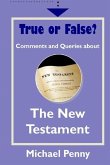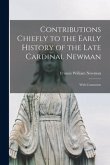This project records the comments of a skeptic who, while not identifying as an atheist, nevertheless raises questions atheists and unbelievers have voiced against Biblical Christianity. The Commentator (ASkeptic) is the author of a series of comments to a selection of posts not included here. The author considers it worthwhile to document the thoughts of a skeptic as this person raises a number of objections demanding reasons, arguments, or proofs for Scripturalism as a worldview. Scripturalism holds that the Scripture is true in all it proclaims, declares, asserts, and implies - all being the key word in this proposition. It is inerrant, infallible, and logical for it records the thoughts (propositions) of God who is truth. Consequently, the Scripture is free from any and all contradictions; God is not the author of lies nor of confusion. He is not insane; He is not irrational. The structure of God's mind is logic. The revealed truths of His Word are revelations of His thinking. These true propositions serve as premises from which one may deduce theorems which together with other premises (truths) and theorems form a system - a system of true propositions (doctrines) that display the grandeur and beauty of the mind of God. The original Greek meaning of skeptikos (derived from the Greek noun skepsis) is assumed in this project. It means one who presumably seeks comprehension. The skeptic's method is to raise objections, ask complex questions that create doubt or uncertainty, and demand proof, in our case for the claims of Scripturalism as a worldview. A careful reader will understand what the skeptic thinks about the truths of Scripture. But what are some of the reasons a skeptic persists in unbelief? What is the skeptic objecting to and why? There are different approaches to this skeptic's inquiries. One approach would be to identify the type of skepticism to determine and fashion appropriate responses to it, but since our purpose is not to refute skepticism, no matter what type, this project uses a different approach. In this project, ASkeptic argues that the author of posts makes unsupported claims. These, according to the skeptic, require proofs in order to make sense of them and only thereafter might the question of assent be considered. In this way, the Commentator/Skeptic casts doubt. The anti-Scriptural worldview is shown, however, to be a path on the broad way to destruction. The skeptic, not surprisingly, denies that his worldview is in any sense slavery to self and sin leading to hell. A second death is ridiculed. Nevertheless, Scripturalism as a worldview holds to the truth that "all Scripture is breathed out by God and profitable for teaching, for reproof, for training in righteousness." (1 Timothy 3:16) Christianity is a coherent system of true doctrines deduced from Scripture alone. The world's system, as argued by our skeptic, stands opposed; it is a self-centered epistemology on the broad way to the eternal destruction.
Hinweis: Dieser Artikel kann nur an eine deutsche Lieferadresse ausgeliefert werden.
Hinweis: Dieser Artikel kann nur an eine deutsche Lieferadresse ausgeliefert werden.




![The Niagara Church Case [microform]: Containing the Whole of the Correspondence and the Comments of the Toronto Press Thereon: With a Preface, &c The Niagara Church Case [microform]: Containing the Whole of the Correspondence and the Comments of the Toronto Press Thereon: With a Preface, &c](https://bilder.buecher.de/produkte/65/65582/65582025m.jpg)



